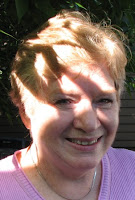 I have written several posts with the label of TERRIFIC READS. And I always list what I am currently reading in the side column of my blog. I have just finished a book that I would call a terrific but difficult read.
I have written several posts with the label of TERRIFIC READS. And I always list what I am currently reading in the side column of my blog. I have just finished a book that I would call a terrific but difficult read.
Arundhati Roy's The God of Small Things is a marvelously crafted novel. It won the Booker Prize several years ago and I have decided that if a book wins the Booker Prize, I will no doubt love the work. I have yet to read a Booker Prize winner that I didn't like, though I would be quick to add I have not read them all. The God of Small Things is not, however, an easy read. Roy sets this novel in relatively contemporary India. The pivotal event of the novel is the accidental drowning of a little girl whose English mother has brought her to India to visit with her Indian father, from whom the mother is divorced. There, she meets her Indian twin cousins, a boy and a girl, who are throughout the novel referred to as the two-egg twins. They are, however, a blended personality.
The novel follows the family fortunes, moving back and forth in time. The time sequence can be a bit confusing because the reader is not always sure if this is the present or the past.
What is so elegantly exquisite about this novel is Roy's command of the English language and her sheer descriptiveness. The book shimmers with descriptions. Settings are described, people's appearances, motivations of characters--every detail is both essential and ephemeral. Here's one marvelous description of futility--"It was like polishing firewood." I thought about that description for a while. What better way to describe something as being futile than to say it is like polishing firewood.
If you want a breezy summer read, don't try this novel. If you want something to sink your mental teeth into, and you want something that will stay with you a long while, then DO try this novel.
I am now re-reading Drowning Ruth. I read this novel several years ago, and decided I wanted to read something to refresh my recollection. I loved this work when it first came out. It ended up being an Oprah book club pick (remember--don't tell me what Oprah is reading?). BUT when I bought this in a local book store, that pick had not been announced. The store clerk said to me--oh, good choice. Tomorrow Oprah is announcing this as her next pick.
to read something to refresh my recollection. I loved this work when it first came out. It ended up being an Oprah book club pick (remember--don't tell me what Oprah is reading?). BUT when I bought this in a local book store, that pick had not been announced. The store clerk said to me--oh, good choice. Tomorrow Oprah is announcing this as her next pick.
Well, I bought it anyway. Here's a the description from the Barnes and Noble website:
Deftly written and emotionally powerful, Drowning Ruth is a stunning portrait of the ties that bind sisters together and the forces that tear them apart, of the dangers of keeping secrets and the explosive repercussions when they are exposed. A mesmerizing and achingly beautiful debut.
Winter, 1919. Amanda Starkey spends her days nursing soldiers wounded in the Great War. Finding herself suddenly overwhelmed, she flees Milwaukee and retreats to her family's farm on Nagawaukee Lake, seeking comfort with her younger sister, Mathilda, and three-year-old niece, Ruth. But very soon, Amanda comes to see that her old home is no refuge--she has carried her troubles with her. On one terrible night almost a year later, Amanda loses nearly everything that is dearest to her when her sister mysteriously disappears and is later found drowned beneath the ice that covers the lake. When Mathilda's husband comes home from the war, wounded and troubled himself, he finds that Amanda has taken charge of Ruth and the farm, assuming her responsibility with a frightening intensity. Wry and guarded, Amanda tells the story of her family in careful doses, as anxious to hide from herself as from us the secrets of her own past and of that night.
Ruth, haunted by her own memory of that fateful night, grows up under the watchful eye of her prickly and possessive aunt and gradually becomes aware of the odd events of her childhood. As she tells her own story with increasing clarity, she reveals the mounting toll that her aunt's secrets exact from her family and everyone around her, until the heartrending truth is uncovered.
All set now with your summer reads? You could tell me what you are reading this summer?

















































